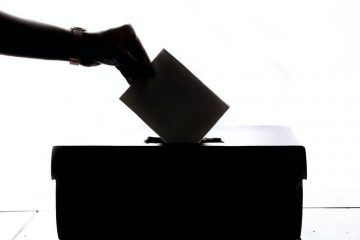by Emrys Westacott
 America is a truck rolling down a hill towards a cliff. The downhill slope is the erosion of democratic norms; the cliff is the point where anti-democratic forces become powerful enough to crush democratic opposition by authoritarian means. The re-election of Donald Trump would very likely see the country sail over that cliff.
America is a truck rolling down a hill towards a cliff. The downhill slope is the erosion of democratic norms; the cliff is the point where anti-democratic forces become powerful enough to crush democratic opposition by authoritarian means. The re-election of Donald Trump would very likely see the country sail over that cliff.
In this situation, anyone who believes that it would be a good thing to preserve what remains of American democracy and, if possible, to strengthen it and extend it so as to better realize the nation’s professed ideals, should want to see Trump and his Republican enablers in Congress soundly defeated. So anyone who has a vote should use it accordingly. Each such vote is a hand on the wheel trying to steer the truck away from disaster. To vote for Trump is to help push the truck over the cliff. To refuse to vote for Joe Biden (the presumptive Democratic candidate), especially in swing states, is effectively to stand by and watch as disaster threatens.
I understand the frustration progressive-minded people feel with a candidate like Biden. I feel it too. Once again, as so many times before, we are asked to vote for an establishment politician whose record does not indicate any deep commitment to really challenging the status quo, because the alternative is so much worse. There are only two arguments to support withholding one’s vote; but both of them are bad.
The first argument is, in effect, that things have to get worse in order for them to get better. This is the sort of reasoning behind philosopher Slavov Zizek’s preference for Trump over Clinton in 2016. The idea is that the Democratic establishment is insufficiently progressive, but the election of Trump can energize progressive forces and trigger a radicalization of the Democratic party.
One problem with this view is that it rests on a highly speculative and decidedly dubious prediction. Just how dubious is revealed by the fact that four years later the presumptive Democratic nominee for president is Biden, who hardly has a reputation for being radical.
A second problem is that it ignores or seriously underestimates the long-term harm that can be done before the hoped-for good consequences ensue. Every one of Trump’s judicial appointments–and to date 200 hundred of these have been confirmed–is a brick in a wall against progress; every annulled environmental regulation is a further step toward irreversible ecological damage to the planet.
A third objection the argument is moral. The “things need to get worse in order to get better” attitude betrays a callous indifference toward all those who suffer as a result of Trump’s policies. These are overwhelmingly the least well off, both in the US and abroad, including the poor, the sick, undocumented immigrants, refugees, the victims of climate change and others who suffer the consequences of environmental degradation. It also now includes, of course, all those who will have unnecessarily died or lost loved ones during the current pandemic thanks to Trump’s utter failure to provide rational leadership. (One couldn’t predict the pandemic; but one could certainly predict that Trump’s response to any crisis would be ignorant, incompetent, and self-centered.)
The second argument for withholding one’s vote is that it makes little or no difference who becomes president or which party controls the House and the Senate. In my view this is hardly ever correct. On matters such as judicial appointments, environmental regulations, and civil rights, to name just a few, it typically makes a big difference who is in power. If someone thinks there is no significant difference between a Ruth Bader Ginsberg and a Brett Kavanagh, or that the scrapping of a hundred environmental protection rules has no important impact, then they will be hard to convince on this point. But in the present situation, I believe the idea that it will make little difference who is elected is truly naïve. It seriously underestimates the clear and present danger that an authoritarian like Trump will continue to trample underfoot the normal rules and conventions of democratic government to the point where the country’s entire political culture is irretrievably damaged. (Zizek considers this worry to be “a ridiculous exaggeration.”)[1]
Trump’s authoritarian impulses and ambitions are no secret. He claims to be above the law himself, views the Dept. of Justice as an agency to protect and advance his own interests. pardons fellow crooks, seeks to imprison political enemies, instructs his staff to ignore subpoenas from Congress, denounces any media that expresses criticism of him as public enemies, encourages gun-toting supporters to consider “second amendment solutions” to their grievances, orders armed federal forces to use unprovoked violence against peaceful protesters, supports various forms of systematic voter suppression, declares that he may not accept the result of the election if he loses (one of his few utterances that can bebelieved)……the list goes on.
Comparisons of anyone with Hitler usually seem hyperbolic given the enormity of the Nazi’s crimes. But a comparison of the current situation in the US and that of Germany in 1932 is by no means absurd. In November of 1932, a free election in Germany failed to produce a clear winner, although Hitler’s Nazi party won the most votes and the most seats in the Reichstag. President Hindenburg appointed Hitler Chancellor in January of 1933, and that was the end of any form of democracy. Four weeks later, the Reichstag was set on fire. Hitler accused the communists of starting it. A state of emergency was declared, civil liberties were “suspended” (i.e. abolished), democratic institutions ended, and anti-Nazis were rounded up. The purpose of the comparison to the current situation in America is not to suggest that Trump is plotting world war or a holocaust (although I have no doubt that his pathological narcissism makes him willing to sacrifice many lives to win an election). It is to underscore the point that if authoritarian forces are given the opportunity, they can and will try to consolidate their hold on power by any means at their disposal; and if they succeed in doing this, we can quickly go past the point of no return.
It’s possible, of course, that we are already past that point. American democracy is a sick beast at the best of times. Trump received 3 million fewer votes than Hilary Clinton yet thanks to the outmoded Electoral College system he became president. The senate is extraordinarily unrepresentative: 40 million Californians have two senators, while 40 million citizens spread across 23 smaller states are represented by 46 senators. Many House districts are shamelessly gerrymandered: in North Carolina, for instance, Democrats won 50% of the votes in 2018, but only 23% of the House seats. At the state level, gerrymandering is even worse. Over six million US citizens are denied the right to vote because of a felony conviction.[2] In many states, Republicans actively seek to suppress the vote by imposing unnecessary ID requirements, by failing to ensure adequate polling facilities, and by blatant intimidation. Then there’s the obscene influence of money over the whole process, ensuring that corporate interests and rich donors to campaign coffers exert massive influence over policy. There’s also the unreliable voting methods (remember ‘hanging chads’?), the vulnerability to foreign interference (which since it favours him, Trump seems happy with), the degraded level of political debate–elections as sporting events; rational discussion reduced to dueling tweets……the list goes on.
The chief explanation for many of these failings is not hard to fathom. The Democrats certainly don’t have a great record of keeping their hands clean, taking principled stances against gerrymandering, and pulling out all the stops to rectify the problems. But it is the Republicans who are responsible for virtually all attempts in recent years to suppress the vote. On this topic, Andy Kroll’s excellent recent article in Rolling Stone, “The Plot Against America: The GOP’s Plan to Suppress the Vote and Sabotage the Election” is a must-read. After describing the current Republican campaign to suppress the vote this coming November (a campaign well funded by some Very Deep Pockets), Kroll concludes:
It’s possible that voter suppression isn’t the only goal — it’s also about creating chaos and confusion before, on, and after Election Day. Perhaps Trump’s assault on voting in our pandemic election year isn’t a “strategy” at all but rather a kamikaze mission aimed at the heart of American democracy.
The point of the “kamikaze mission,” of course, would be to invalidate the election were Trump to lose. And anyone who thinks that the likes of Mitch McConnell would not go along with such a strategy as a way of holding onto power must have been quarantining themselves from distasteful political spectacles for the past ten years.
And why does the GOP want to suppress the vote? Obviously, they think doing so will help them electorally, especially since they particularly target Black and Hispanic communities. But that campaign has to be understood as part of a broader effort to hold on to power in increasingly unfavourable circumstances. Republicans are worried–justifiably–that the demographic and ideological tides are against them. The more democratic a country is, the more its political leaders reflect the views of the people. On most major issues today–health care, the environment, climate change, immigration, taxes, campaign finance, gun control, poverty, inequality, racism, sexual discrimination–the Republican positions have become increasingly unpopular, especially among younger voters. The growing portion of the population that is non-white also spells trouble for the GOP.
Faced with this problem, the Republicans had three choices: (1) Embrace policies more in line with public opinion; (2) Hold fast to outmoded, unpopular views and gracefully accept defeat at the polls; (3) Use every means at their disposal to obstruct and adulterate the democratic process in order to hold on to power. They chose (3). This is their way of building a wall to hold back the tide of history.
But while American democracy may be sick–it was, after all, born with congenital birth defects–it still has a pulse. And while there is life, there is hope. Given Trump’s dismal approval ratings, one is tempted to say that if there is hope it lies in the polls. Ultimately, though, it lies with every vote cast against him and his cynical enablers.
[1] Slavov Zizek, “Was I right to back Doanld Trump over Hilary Clinton? Absolutely,” The Independent, June 26, 2019.
[2] This figure for felony disenfranchisement is given by the Sentencing Project.
